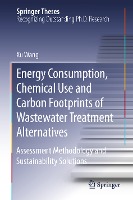
This thesis focuses on the energy, chemical and carbon implications of diverse wastewater treatment alternatives, and offers effective solutions for wastewater treatment plants (WWTPs) to achieve sustainability goals. The author first uses the life cycle philosophy to explore the environmental performance of several representative wastewater treatment systems, and then proposes a refined assessment framework, accompanying analytical toolkit and case study for further quantifying the environmental sustainability of various wastewater management scenarios. Allowing readers to gain a better understanding of the existing wastewater treatment technologies from a sustainability perspective, this book helps decision makers identify promising approaches to the environmentally friendly operation of WWTPs and make infrastructure investments that are appropriate for future changing conditions.
Deze dissertatie richt zich op de energie-, chemische- en koolstofimplicaties van diverse afvalwaterbehandelingsalternatieven, en biedt effectieve oplossingen voor afvalwaterzuiveringsinstallaties (AWZI’s) om duurzaamheidsdoelen te bereiken. De auteur gebruikt eerst de levenscyclusfilosofie om de milieuprestaties van verschillende representatieve afvalwaterbehandelingssystemen te onderzoeken, en stelt vervolgens een verfijnd beoordelingskader, begeleidende analytische toolkit en casestudy voor om de milieuduurzaamheid van verschillende afvalwaterbeheerscenario’s verder te kwantificeren. Dit boek geeft de lezer een beter inzicht in de bestaande afvalwaterzuiveringstechnologieën vanuit een duurzaamheidsperspectief en helpt besluitvormers veelbelovende benaderingen voor een milieuvriendelijke exploitatie van afvalwaterzuiveringsinstallaties te identificeren en investeringen in infrastructuur te doen die geschikt zijn voor toekomstige veranderende omstandigheden.
Geef een reactie
Je moet ingelogd zijn op om een reactie te plaatsen.